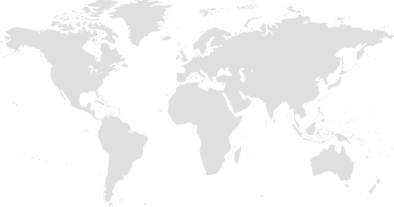Keen to Compost?
Just fill out a couple of details and we’ll be in touch with information about composting opportunities specific to your area.
Fill out our form

Vegware's composting solutions
Waste activism is at the heart of Vegware's award-winning environmental services.
Since 2012, our Environmental team have been forging links with the waste sector, identifying new routes to commercial composting and running large-scale trials at industrial composting facilities. We can advise on your composting options, from trade waste collections and Vegware’s own Close the Loop service to on-site composting and a UK-wide post-back service. No site is too big or too small for us to explore the possibilities. And we encourage customers who compost to offer bring-back schemes so you can capture used Vegware takeaways for composting. Learn more so you can compost your Vegware!
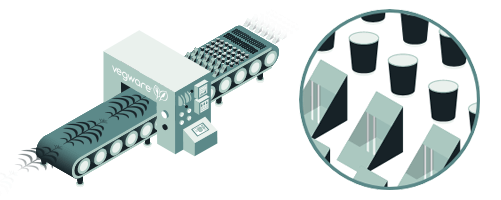
Packaging made from plants
Our plant-based compostable foodservice packaging is made from renewable, recycled or reclaimed materials. In its finished form, Vegware can be commercially composted with food waste, where accepted. We hold the sector's most extensive set of compostability certification, which is an independent guarantee our products can be processed in the correct facilities.
Visual cues
Visual cues like bin signage and posters designed by Vegware helps everyone on your site know which bin to put waste in. Compostable disposables are designed to be recycled in an industrial composting facility together with food waste. That means there’s no need for sorting, and the compostable cup, lid, burger box, knife and napkin can all go together without removing the ketchup and leftover chips. An extra bonus is that once food and disposables share one bin, other dry recycling bins are cleaner and easier to recycle.
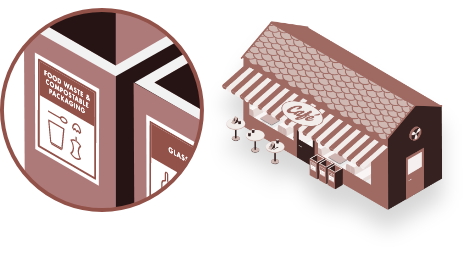

Collection
Vegware can consult on your region’s composting collection options. Compostables are still relative newcomers compared to other materials, so trade collections aren’t yet available everywhere, but we are actively changing this through our partnerships with the waste sector. If there's no collection in your region, the sustainability benefits of using renewable materials, instead of finite oil-based resources, still apply. Learn more about what happens to Vegware in general waste.
Composting
Officially defined as a form of recycling, composting keeps resources in your region without relying on export. Your waste is turned into useful resources, helping your business to reduce its environmental impact and join the circular economy. Compost is used in agriculture, horticulture, and landscaping to nourish soil and improve its structure to help grow healthy plants. Learn more about the benefits of compost and why soil matters.
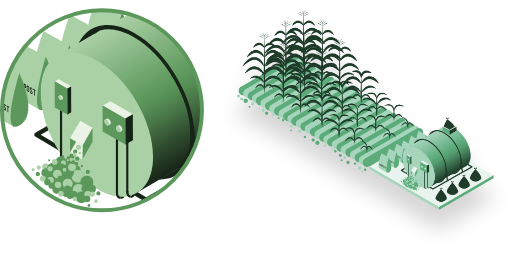
Composting regions
Trade waste collections
Vegware works with the waste sector to actively grow trade waste collection routes. We work around the world with a variety of waste operators and can work alongside your region's waste consultants.
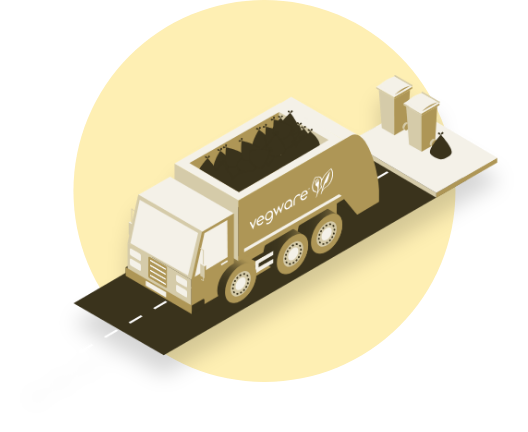

Close the Loop is Vegware’s own waste collection service in Central Belt Scotland.
We collect used Vegware packaging from our clients, for commercial composting in under 12 weeks.
We can provide bin signage and expert help to get you started.
Available in Glasgow, Edinburgh, Dundee & Central Belt.
Find out more

Platform - Argyle St Tarcges, Glasgow

Susan Paton - Café Manager, Dynamic Earth
Watch our video case study
See our Close the Loop composting collection service in action at the Edinburgh International Book Festival.On-site composting
On-site composting presents a remarkable opportunity for sites to transform their waste into a valuable resource while simultaneously reducing carbon emissions associated with waste transportation. This localised approach not only reduces the environmental impact but also offers logistical and cost advantages for organisations.Through extensive research and development, we have successfully trialed various on-site composting systems, enabling us to provide expert advice on the most effective solutions for your site.
Watch on-site composting in action
See how an on-site composter allowed Vegware client Dundee and Angus College to take control of food waste, reduce packaging in canteens, and move away from conventional plastics.
Vegware has teamed up with UK waste company First Mile who offer a Return and Recycle pack. A courier service collects all used Vegware catering disposables to be composted with food waste. The high-grade compost produced is used on local farmer's fields. See how this service is perfect for recycling small quantities of Vegware.

Commercial composting explained
Commercial, also known as industrial, composting facilities are where used Vegware can go to be processed together with food waste. There are facilities throughout the UK, and worldwide, processing used Vegware.
In-vessel composting (IVC) is the main process suited to composting our products, as well as Open windrow and some Anaerobic digestion (AD) plants with a composting phase.
In-vessel composting (IVC)
In-vessel composting is the ideal process for used Vegware products. This method mixes green waste with food waste and compostable packaging in a fully enclosed vessel. Heat is generated naturally, allowing the material to break down to produce compost free of any harmful bacteria. This compost can then be used as a high quality soil conditioner.

Anaerobic digestion (AD)
Anaerobic digestion converts organic waste into renewable biogas and digestate, a natural fertiliser, in a managed process that is oxygen-free. Some forms of AD can process Vegware, such as dry AD, which includes an aerobic phase.

Open windrow
Open windrow is an industrial composting method where compostable matter lies in long piles exposed to air rather than being processed in an enclosed vessel. It is common in the US and can successfully compost all of Vegware’s products. In Europe it is mainly used for garden waste. UK and Irish regulations do not allow food waste to go to this process, but garden waste composting facilities can process Vegware’s certified drinks waste if they like, based on this initiative by Vegware with UK governing bodies.
Let us answer your questions on composting
- What's the point of disposables being compostable?
- Composting is a form of recycling which keeps resources local, unlike much plastic and paper which is exported overseas with no guarantee of it actually being recycled.
Compostable disposables are designed to be recycled in an industrial composting facility together with food waste. That means there’s no need for sorting, and the compostable cup, lid, burger box, knife and napkin can all go together without removing the ketchup and leftover chips. An extra bonus is that once food and disposables share one bin, other dry recycling bins are cleaner and easier to recycle.
Compostability isn’t best for all situations. For example, Vegware wouldn’t make compostable water bottles, as PET plastic already has a developed recycling infrastructure. But for food-contaminated disposables, compostability is a sensible solution. - How can Vegware help clients find composting solutions?
- Our full-time Environmental team are experts in helping clients find composting solutions for their used Vegware – we've been working on this full-time since 2012. Find out more about your region's composting options by visiting the Composting tab under our About page.
- How do compostables solve food contamination?
- Combining plastic and card in foodservice packaging can create massive recycling challenges. Food contamination is inevitable, so the result is incineration or landfill.
For disposables destined for serving food, it makes sense to use materials that can be recycled together with food. With compostable disposables, food isn’t contamination, it’s a vital ingredient in the composting process. - What's wrong with 'recyclable'?
- Everyone likes the word ‘recyclable’, but here’s some news which highlights the real challenges of recycling used ‘recyclable’ packaging.
Many countries export their recycling, and recent news has brought to light that it's not actually getting recycled.
For example, the UK exports 70% of its paper and 66% of its plastic for recycling. China took a lot of exported UK recycling, but over the years discovered it isn’t good enough quality to recycle. Since January 2018, China has banned imports of household plastics, and only accepts cardboard and paper with less than 0.5% contamination. Other Asian countries are implementing or considering similar bans, to avoid becoming a dumping ground for unrecyclable waste. Food contamination is a major problem, and the British recycling industry worries that most UK card and paper won’t meet China’s standards.
What’s the learning here? That in reality, card + plastic + food isn’t recyclable. - Do plant-based materials work as well as plastic?
- Absolutely. We’ve won awards for our product quality and functionality, in addition to being recognised for our social and environmental impact.
- What's the difference between biodegradable and compostable?
- Same process, different breakdown speeds. Biodegradable tells us nothing about timescales – for example, wood is biodegradable,
but a log cabin can stand for generations. Compostable means that packaging can break down in under 12 weeks in composting conditions,
and is therefore suitable for industrial composting.
Make sure your disposables supplier has compostability certification – that’s the real guarantee. Vegware holds the most extensive compostability certification of any UK packaging supplier – read more about certification in the Our materials section of our About page. - What are the benefits of compost?
- Officially defined as a form of recycling, composting keeps resources in your region without relying on export.
Waste is turned into useful resources, helping businesses reduce their environmental impact and join the circular economy.
Compost is used in agriculture, horticulture, and landscaping to nourish soil and improve its structure to help grow healthy plants. It sequesters carbon and can also help reduce the risk of floods – UK soils are in crisis, and former Environment Secretary, Michael Gove, has warned that British farms are 30 to 40 years away from “the fundamental eradication of soil fertility”. Compost returns nutrients to the soil, and has the added benefit of improving soil structure. - Where can Vegware be composted?
- As you read this, there are industrial composting facilities processing used Vegware. Since 2012,
our Environmental team have been working with composters to set up trials to make sure it works in practice.
In-vessel composting (IVC) is one of the main processes suited to composting our products, as well some
anaerobic digestion (AD) plants with a composting phase.
Within the UK, we work with a number of the suitable in-vessel composting facilities, and are actively engaging with the waste sector to overcome any barriers. Additionally, since July 2018, UK garden waste composting facilities (using open windrow composting) are officially allowed to consider processing certified compostable drinks cups and lids.
Read more about commercial composting, as well as options in your part of the world, under the Composting section on our About page. - What are composting conditions?
- Compostable packaging needs to be in the right composting conditions in order to break down. Commercial, also known as industrial, composting creates the perfect balance of microbes, moisture and warmth, so that compostable packaging can be included in food waste recycling. Learn more about composting in our Composting section on the About page.
- Can I compost Vegware at home in my garden?
- Home composting conditions and the householder's skills vary, so we don't make any claims here, but there have been successful trials using hot compost bins.
Additionally, some Vegware packaging is certified home compostable, including our NatureFlex products and bin liners. For the best results, we advise industrial composting. - Can I include Vegware in my household food waste collection?
- Within a UK household food waste collection, our products would be recognised as contamination. Unfortunately, at present compostables are not wide spread enough for UK councils to adapt their collections to include compostable packaging along with food waste.
In the Republic of Ireland, all businesses and householders are required to have a brown bin, which goes to organics recycling for composting, and can include Vegware. - What about composting collections?
- Compostables are still relative newcomers compared to other materials, so trade collections aren’t available everywhere,
but Vegware is actively changing that in the UK, and assisting clients worldwide to help them identify solutions.
In the UK, we partner with the waste sector in many regions and have also launched our own composting collection service, Close the Loop. We have near-national coverage for Scotland, and are working on launching in other regions.
Within the US, our Product and Zero Waste Specialists advise clients on options in their region so they can compost their Vegware. For the rest of the world, our Environmental team, located in our Edinburgh, UK headquarters, can provide guidance. Refer to the Composting section of our About page for more information. - Is Vegware suitable for on-site composting?
- If you have space, staff, and a use for compost, on-site composting can be an exciting opportunity to process your used Vegware. Read more in our Composting section under the About page.
- Can I compost Vegware in my area?
- Visit our Composting section on the About page to see how Vegware's Environmental team can support your region.
- If I can’t compost my Vegware, is it still better for the environment than conventional packaging?
- Yes! There are benefits of Vegware packaging on the production-side. Our products are made from plants using renewable, recycled or reclaimed materials.
The earth has finite resources. Disposables are used for such a short time, so it makes sense to switch to renewable materials, reserving conventional plastics for applications where they can’t be easily replaced. Lots of people use Vegware in the knowledge that our Environmental team can assist in setting up composting collections. - Which bin should it go in if I can't compost it?
- Where there is no access to industrial composting facilities, used Vegware should be put in general waste. Vegware’s takeaway packaging is made from plants using renewable, recycled or reclaimed materials, and these benefits still apply no matter what happens to them after use.
Used Vegware should not be placed in standard recycling bins which collect paper, plastics and metals, as those materials go to a different type of sorting facility. Another reason is that food waste harms the quality of mechanical recycling – the same applies to any used foodservice disposables.
General waste goes to either incineration or landfill. If Vegware is incinerated, energy is produced. Incineration studies on compostable packaging from NatureWorks, a key materials supplier of ours, show that their PLA bioplastic produces more heat than newspaper, wood or food waste; also that it produces no volatile gases and leaves little residue. Some in the waste sector prefer plant-based materials over conventional plastics as they give off fewer toxic gases.
In landfill, studies have shown that compostable packaging is inert and does not give off methane.
Please do not litter – compostable packaging is not expected to break down when discarded in the environment, and is not a solution to marine pollution. - Can Vegware be recycled with card or plastic?
- Conventional food packaging products are not typically recyclable because they are made of mixed materials and are contaminated with food. We do not advise our customers to recycle our products with dry mixed recycling. Instead, we work with our customers in closed environments to find a route to composting for used Vegware products and food waste.
- Will Vegware products compost in landfill?
- Not many people are aware that landfill conditions are actually designed to prevent materials breaking down. At Vegware, we designed a comprehensive range of compostable disposables in order to help divert disposables and associated food waste from landfill.
- Will Vegware products biodegrade in the sea/ocean?
- Our products are designed to break down with food waste, we have not tested how our products behave in marine conditions. We want to see an end to marine litter. At Vegware, we work tirelessly to promote composting of plant-based materials as an alternative to unrecyclable plastic waste.
- Where is it easiest to capture used compostables?
- Vegware’s close ties to the waste sector means we are able to help identify composting solutions for many of our clients – from contract caterers operating on-site dining for large corporate office buildings, hotels, universities, and more –
to independent cafés and those holding events such as large-scale festivals or sports venues. We also encourage sites to offer
a bring-back scheme to entice customers to return their used Vegware takeaways. This can operate as a loyalty card scheme,
with customers earning a point or stamp towards a free drink or other treat, for each item returned.
Used Vegware can be captured within the site’s bins, designated by signage for composting, which allows us to work with their waste teams to set up composting schemes. Cup recycling schemes are making huge strides; however, ours is a solution for all disposables and food waste, not just cups. - What about on-the-go?
- Composting your Vegware? Offer a bring-back scheme! We encourage clients to operate a loyalty programme with a difference, rewarding customers who bring back their used Vegware while tackling the issue of on-the-go recycling.
Many clients offer their own loyalty card where, for each used Vegware product returned, a customer earns a point or stamp towards a free hot drink or other treat. This helps increase footfall while capturing used Vegware takeaways, helping to get the packaging into the correct waste stream so it can fulfil its potential to become compost, while also boosting clients' recycling rates and green credentials. - How can I introduce a new recycling system to my site?
- Vegware clients who are composting their used Vegware can receive award-winning support from our Environmental team. A key part of the switch-over is education and behaviour change, creating clear bin signage and training everyone involved – from customers to catering managers and waste operatives.
- If plastics are easily recycled, shouldn't I just use plastic packaging?
- The actuality is they can’t be recycled easily. Foodservice packaging made from conventional oil-based plastics – once stained with food and drink residue –
are a massive recycling challenge.
A lot of UK plastic and paper is exported overseas with no guarantee it is actually being recycled. Britain does not have the requisite infrastructure to recycle its own plastic waste, with only 9% of plastic recycled domestically. Most often, plastic can only be recycled one or two times, often into something that is unable to hold food or heavy items.
Instead, composting is a local form of recycling, boosting local economy and supplying nutrient-rich compost for local agricultural, horticultural or flood management. Read more here about how Vegware has been growing the UK’s trade routes to access composting.


